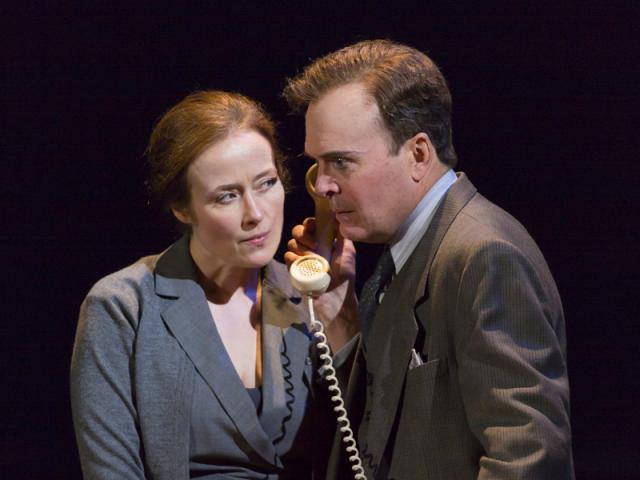
The widely acclaimed Off-Broadway production of J. T. Rogers’s play,Oslo, last year in Lincoln Center's Mitzi Newhouse Theater has now moved to the spacious Lincoln Center's Vivian Beaumont Theater. The story, documented but almost completely unknown, is rich and ambitious. The wide stage illuminates its dramatic depth, presenting its vitality and timeliness with more strength and humor than the previous production. Watching it today, when diplomacy seems frighteningly absent in our current political atmosphere, this behind-the-scenes exploration is especially thrilling. (The second intermission has been eliminated but otherwise, the Vivian Beaumont production is the same as the Off-Broadway original.) The following is a slightly edited version of Elizabeth Ahlfors' review of last year's production at the Mitzi Newhouse Theater, which ran in Citycabaret.com in the summer of 2016. * In 1993, an historic handshake in the White House Rose Garden offered a promise but ultimately failed to deliver fulfillment. What is fulfilling is J.T. Rogers's captivating and inspired drama, Oslo, now on Lincoln Center Theater's Vivian Beaumont stage. Rogers goes behind-the-scenes of the Oslo Peace Accords between Israeli prime minister Yitzhak Rabin and chairman Yasser Arafat of the Palestine Liberation Organization, and reveal the secret and vital role of two Norwegians in bringing it all about. Te play's three hours of intrigue follow Norwegian Terje Rød-Larsen (Jefferson Mays) director of the Fafo Institute for Applied Social Sciences, and his wife Mona Juul (Jennifer Ehle) of Norway's Foreign Ministry. The well-drawn book is skillfully paced by director Bartlett Sher, stressing the possibilities of striving for a challenging peace, with Larsen and Juul planning secret meetings at Borregaard Estate outside of Oslo between the emissaries from Israel and Palestine. The play poses thrilling arguments, builds with suspense, yet hums with optimism and is punched up with humor. Although the ending reveals the bloodshed that followed the Oslo Accord, Larsen's theme remains, "See how far we have come! If we have come this far, through blood, through fear— hatred—how much further can we yet go?... The Possibility." This spirit keeps the play and its message from falling into pessimistic capitulation. This back story of the Oslo Accords is true and documented but not well known. In the playwright's note, Rogers makes clear that while chronology and locations vary, the characters were all real and the events actually took place. The dialogue is Rogers's. He does not present the play from one perspective, taking neither a Israeli or Palestinian side, but staying mostly equitable. The stress is on a fierce determination for a peaceful agreement in an area that has long been a tinderbox. Adeptly directed by Bartlett Sher, Rogers' exploration before the Washington meeting reveals the clandestine political negotiations, occasional “constructive ambiguity,” dinner parties, waffles and Black Label Scotch, between April, 1992 and September, 1993. With drama, wit and gravitas, the emissaries of the two mid-East countries meet, talk, argue and get to know each other in Oslo preparing for the big talks in Washington by Rabin and Arafat. The fire and fury come from the Palestinians and Israelis. Anthony Azizi is magnetic as P.L.O. Finance Minister Ahmen Qurie or "Abu Ala" and Dariush Kashani is intimidating as sophisticated Hassan Asfour, Official P.L.O. Liason with the Palestinian Delegation at multilateral U.S.-sponsored talks. Daniel Oreskes is Israel's Foreign Minister Shimon Peres (doubling also as a Professor in Haifa). Adam Danniheisser plays Yossi Beilin, Israeli Deputy Foreign Minister and Michael Aronov is brash as Uri Savir, Director General of the Israeli Foreign Ministry. In the performance I attended, Jeff Still portrayed Joel Singer, Jewish Washington lawyer. The acting is forceful and cohesive. Keeping the talks on track, Larsen, played by versatile Jefferson Mays (A Gentleman's Guide to Love and Murder, The Front Page) drives the play in an unassuming yet bold way. His partner in diplomacy, Jennifer Ehle as graceful and unpretentious Mona Juul, periodically breaks the fourth wall and addresses the audience, adding to an understanding of the events. They stand their ground not only against the Israelis and Palestinians but against major Norwegian officials as well. Evolving on the spacious stage, the theatricality of the story stands out starkly against designer Michael Yeargan's spare Scandinavian set with mobile furniture that easily alternate scenes. Background projections provide additional timeline information and Sher keeps a fluid momentum. Catherine Zuber dressed the characters conservatively and lighting by Donald Holder is dramatically emphatic. At the end, the characters step forth to talk about the consequences of the Oslo Accord. The handshake remains on the screen but in reality, the two sides have remained destructively separate. While talky at three hours, Oslo is a thought-provoking work and the determination of Tejre Rod-Larsen and Mona Juul in Oslo 23 years ago is inspirational. One wonders now if such dedication and diplomacy is even an option today with social media, a polarized nation, and the current administration, all of which add a special urgency to the story behind the Oslo Accord.
